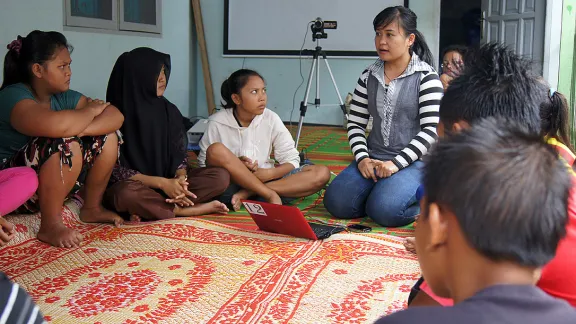
Elisabeth Purba (center) explaining about HIV/AIDS in Desa Bulu Cina, Sumatra, Indonesia. Photo: LWF/C. Kästner
Building Capacity Among Youth
(LWI) - “You are only in middle school. Why do you need to know about HIV and AIDS?” Elisabeth Purba asks. It is late morning in the village of Desa Bulu Cina, and a group of about 40 teenagers sits in the shade under a roof outside a local youth center. Together with three fellow students from Medan, Elisabeth is giving a presentation about the Human Immunodeficiency Virus.
The workshop in Desa Bulu Cina is a follow-up to a capacity-building workshop Elisabeth and about 30 other students attended in May 2014. The workshop was organized by the LWF National Committee in Indonesia. “We identified three topics,” Elisabeth Purba explains, “Climate Justice, Interfaith Relations and HIV/AIDS”. Together with seven fellow students Elisabeth decided to learn more about the immune deficiency disease and share her knowledge in a society where HIV positive people face widespread discrimination. The visit to Desa Bulu Cina is but one of many that the students devote a good portion of their free time to.
The setting is full of contrast: The virus infections are a taboo in Indonesian society, and even more so in small villages like the one two hours from Medan where the workshop takes place. Many of the girls are wearing the traditional headscarf, except for 2 pupils all of them come from Muslim families. For 3 years, the Korean organization Good Neighbors International has been running a small youth center as part of a project against poverty. The staff has a Christian background; the contact was made through the university student organization.
“More open-minded”
It is not a group that most teachers would happily volunteer to assist. Twelve to 17-year-old girls and boys sit apart and shoot glances at one another; the boys hiding in the hoods of their sweatshirts despite the humid tropical heat. Mostly they just listen as Elisabeth and her colleges explain the difference between infection and disease. There is a lot of giggling when it comes to the transmission of the virus. Health education in public schools is rudimentary at best, Liberson Frain, a student of social science, later explains.
The students, who have by now divided the local teenagers into smaller groups, share in the laughter, and expertly move the discussion to accidents and blood transfusions. Seconds later they change back into teacher mode: One by one, the teenagers sitting in a circle have to name a way HIV is or is not transmitted. “It is easier for us to relate to young people” Liberson says, as the atmosphere loosens up and the village youth start asking questions and sharing stories. “We can talk to them in their own language, because we are not much older, and they are more open-minded than adults. Also, they will share what they hear in their peer groups”.
Liberson and Elisabeth received the material for their presentations in the capacity-building workshop, and spent many more hours researching on the internet. Currently Elisabeth is looking into the latest research on HIV transmission via breastfeeding. It is a question some of the girls ask, as being able to live a “normal” life in Indonesia is closely linked to the ability to have a family and raise children. Being from a similar context, Liberson and Elisabeth are mindful of cultural sensitivities. “I do not tell them about condoms” Elisabeth says. “For us, the main issue is to make them aware that HIV positive people are not contagious and should not be treated as outcasts”.
“Bring your friends”
The test to the village youth comes at the end of the morning, when Manior Sihombing gives her testimony. She is HIV positive. “You don’t have to be afraid” Elisabeth advises her pupils as the woman who until now stayed in the background starts shaking the teenager’s hands. Not all of them look entirely comfortable, one or two hide their hands in the sleeves of the sweatshirts. Sihombing was infected by her husband, who had extramarital relations. “When I learned about my infection, I asked for a divorce, but he loved me so much that he would not listen” she says.
Her husband and one of her children have passed away. Her daughter did not contract the virus. Still the family faced discrimination. Sihombing moved to a different community, she changed her workplace and her church. “Some time ago the doctor told me I have tuberculosis,” she says. “I do not have much time left, and I want to use it to make a difference”.
The boys and girls she is telling her story to are clearly impressed. For most of them, it is the first time they see a person with the much talked-about infection. “I did know about AIDS before”, 14-year-old Nanda says. “But I did not know that you could just touch the people and share food with them”.
16-year-old Endang, an attentive girl with a black headscarf, asks the students to come back. “I want to learn more about HIV/AIDS” she says. “We will come again,” Elisabeth promises, “and you will bring your friends!” When Elisabeth later repeats her initial question, Endang is the first to answer. “Because we are tolerant”, she proudly says. “We are Indonesia”.


